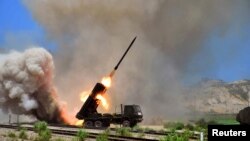North Korea has fired four more short-range projectiles into the sea, the latest in a series of missile and artillery tests.
The South Korean Defense Ministry says the North fired two Wednesday morning and two more later in the day from an area northeast of Pyongyang. The type of projectile used is not yet known.
It is not clear if the weapons landed on the ground in North Korea or made it to the water off its east coast.
The recent increase in weapons tests, many of which defy a United Nations ban on missile tests by Pyongyang, has helped raise tensions on the Korean Peninsula.
An official with South Korea's Foreign Ministry said in a telephone interview with VOA's Korean service Wednesday that Pyongyang’s ballistic missile launches will be discussed by the U.N. Security Council next week.
Lee Ho-ryong, at the Korea Institute of Defense Analyses, says North Korean tests are part of a long-term plan by Pyongyang.
"It is part of [North Korea's] efforts to find a strategically advantageous position in the future," he said. "That being said, the United Nations will need to consider the option of sanctions in a serious manner."
On Tuesday, Admiral Samuel Locklear, who heads the U.S. military's Pacific Command, told reporters that North Korea's weapons activities are a major cause for concern.
"The proliferation activities of North Korea, their desire for nuclear missiles and nuclear capabilities, as we've said over and over again, are highly threatening to the global security environment," he said.
Locklear made the remarks two days after a senior North Korean military official threatened to launch a nuclear strike against the United States, accusing Washington of increasing tensions on the Korean peninsula.
The U.S., South Korea and other nations have been pushing North Korea to halt its nuclear and ballistic weapons programs, which are in violation of U.N. Security Council resolutions.
On Monday, the U.S. House of Representatives voted to increase U.S. sanctions on North Korea to prevent Pyongyang's development and proliferation of weapons technology. The bill still needs to be passed by the Senate and signed by the president before becoming law.
(Jee Abbey Lee contributed to this report, which was produced in collaboration with VOA’s Korean Service.)




